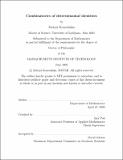Combinatorics of determinantal identities
Author(s)
Konvalinka, Matjaž
DownloadFull printable version (882.5Kb)
Other Contributors
Massachusetts Institute of Technology. Dept. of Mathematics.
Advisor
Igor Pak.
Terms of use
Metadata
Show full item recordAbstract
In this thesis, we apply combinatorial means for proving and generalizing classical determinantal identities. In Chapter 1, we present some historical background and discuss the algebraic framework we employ throughout the thesis. In Chapter 2, we construct a fundamental bijection between certain monomials that proves crucial for most of the results that follow. Chapter 3 studies the first, and possibly the best-known, determinantal identity, the matrix inverse formula, both in the commutative case and in some non-commutative settings (Cartier-Foata variables, right-quantum variables, and their weighted generalizations). We give linear-algebraic and (new) bijective proofs; the latter also give an extension of the Jacobi ratio theorem. Chapter 4 is dedicated to the celebrated MacMahon master theorem. We present numerous generalizations and applications. In Chapter 5, we study another important result, Sylvester's determinantal identity. We not only generalize it to non-commutative cases, we also find a surprising extension that also generalizes the master theorem. Chapter 6 has a slightly different, representation theory flavor; it involves representations of the symmetric group, and also Hecke algebras and their characters. We extend a result on immanants due to Goulden and Jackson to a quantum setting, and reprove certain combinatorial interpretations of the characters of Hecke algebras due to Ram and Remmel.
Description
Thesis (Ph. D.)--Massachusetts Institute of Technology, Dept. of Mathematics, 2008. This electronic version was submitted by the student author. The certified thesis is available in the Institute Archives and Special Collections. Includes bibliographical references (p. 125-129).
Date issued
2008Department
Massachusetts Institute of Technology. Department of MathematicsPublisher
Massachusetts Institute of Technology
Keywords
Mathematics.